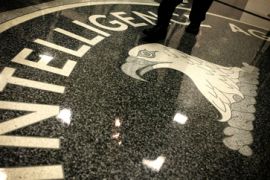The US counterterrorism bureaucracy
We take a look at the various intelligence agencies involved in connecting the dots.

 |
| US agencies have been criticised for failing to prevent the Christmas Day bomb attack [Reuters] |
Barack Obama, the US president, has summoned US intelligence, counterterrorism and homeland security chiefs to a meeting on Tuesday to discuss how to prevent a repeat of the attempted bombing of an airliner on Christmas Day.
Despite intelligence from various agencies regarding the movements of accused Nigerian bomber Umar Farouk Abdulmutallab, the information was not collated in what Obama called a “systematic” failure.
The incident has prompted the White House to launch a review of what government agencies knew about Abdulmutallab, the plans of al-Qaeda in the Arabian Peninsula, and why their alleged plot was not uncovered in advance.
The agencies involved are as follows:
| National Counterterrorism Center |
The NCTC was created in 2004 to co-ordinate efforts between US intelligence agencies, whose failure to share information was lambasted by the commission into the September 2001 attacks on the US.
It is the main processing centre for counterterrorism intelligence gathered by more than 16 government agencies, including the Central Intelligence Agency (CIA) and the National Security Agency (NSA).
The NCTC had intelligence about Abdulmutallab but was criticised for its failure to “connect the dots”.
| National Security Agency |
The NSA, which answers to the secretary of defence and the director of national intelligence, intercepts and monitors communications from overseas targets.
About four months before the attempted bombing, the NSA intercepted telephone conversations in which the leaders of al-Qaeda in the Arabian Peninsula talked about the possibility of using an unidentified “Nigerian” bomber in an attack, according to intelligence officials.
John Brennan, Obama’s top White House adviser on counterterrorism, said the intercepts were shared with the NCTC.
| Central Intelligence Agency |
The CIA oversees and carries out clandestine operations around the world.
It first learned of Abdulmutallab on November 19, when his father came to the US embassy in Abuja, the Nigerian capital, and sought help in finding him, according to an agency spokesman.
The agency said it worked with the embassy to add Abdulmutallab and his possible Yemeni contacts to a US database of terror suspects and forwarded biographical information about him to the NCTC.
Critics say the CIA should have done more to flag the intelligence, but a US intelligence official said Abdulmutallab’s father never said that his son “was a terrorist” or was planning an attack.
| Office of the Director of National Intelligence |
The director of national intelligence (DNI) is ultimately responsible for integrating foreign, military and domestic intelligence.
Pieces of information started streaming in during the summer and fall about al-Qaeda in the Arabian Peninsula’s plans to carry out attacks, but officials said there was not enough intelligence available to identify Abdulmutallab.
In recent months, Dennis Blair, its director, and Leon Panetta, the head of the CIA, are said to have waged a behind-the-scenes ‘turf battle’ over Blair’s oversight role.
But the White House and intelligence officials say the DNI, the CIA and other intelligence agencies continued to share information as required.
| State Department |
US diplomats took part in the November 19 meeting with Abdulmutallab’s father in Abuja and forwarded the information by unclassified cable to the NCTC on November 20.
But officials said the information was deemed insufficient to revoke Abdulmutallab’s US visa.
Department officials argue that they generally rely on an inter-agency screening system to advise if visas should be revoked on security-related grounds, and that no such recommendation was made in this instance.
Critics say the department should have been alert to the threat after the UK denied Abdulmutallab a student visa to attend a bogus institution.
US officials say British authorities never informed them that the visa was denied, although they describe co-operation between the two countries since the incident as “seamless”.
| Department of Homeland Security |
George Bush, the former US president, created an office of homeland security in response to the September 2001 attacks on the US.
Now a massive agency with about 225,000 employees, it includes a focus on security for the US borders, transportation systems and cybersecurity.
It includes the US Coast Guard, Transportation Security Administration, Secret Service, US Customs and Border Protection and US Immigration and Customs Enforcement.
Janet Napolitano, the head of homeland security, had to make an embarrassing U-turn in the aftermath of the Christmas Day attack, admitting the aviation security system “did not work,” just a day after claiming that “the system worked”.